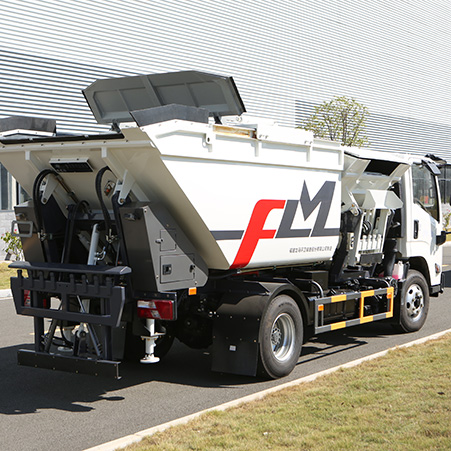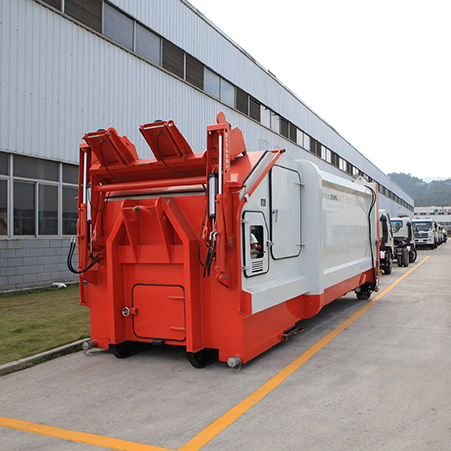Dumpster trucks are the workhorses of urban waste management, responsible for collecting, transporting, and disposing of large volumes of waste. They navigate the intricate network of city streets, collecting waste from residential, commercial, and industrial areas. Their efficiency and reliability are critical to ensuring that waste is managed properly and that cities remain clean and livable. In modern cities, dumpster trucks have evolved beyond simple collection vehicles into sophisticated machines equipped with advanced technologies to enhance their performance and reduce their environmental impact.

The Evolution of Dumpster Trucks
The journey of dumpster trucks from basic waste collection vehicles to high-tech machines is fascinating. Historically, dumpster trucks were simple, manually operated vehicles designed to collect and transport waste. They were labor-intensive and often inefficient, leading to high operational costs and environmental impact.
Over the years, technological advancements have transformed dumpster trucks into more efficient and environmentally friendly vehicles. Modern dumpster trucks are equipped with GPS systems for route optimization, IoT sensors for real-time monitoring, and automated systems to reduce manual labor. These innovations have significantly improved the efficiency of waste collection, reduced fuel consumption, and minimized the environmental footprint of waste management operations.
Benefits Of Electric Dumpster Trucks
One of the most significant advancements in the realm of dumpster trucks is the advent of electric dumpster trucks. These vehicles offer numerous benefits over their traditional diesel counterparts:
- Environmental Benefits: Electric dumpster trucks produce zero emissions, reducing air pollution and contributing to cleaner urban environments. This is particularly important in densely populated areas where air quality is a major concern.
- Operational Efficiency: Electric trucks are quieter and require less maintenance than diesel trucks, reducing operational costs and noise pollution. Their quieter operation is especially beneficial for early-morning or late-night waste collection in residential areas.
- Cost Savings: Although the initial investment in electric dumpster trucks is higher, the long-term savings in fuel and maintenance costs can be substantial. Additionally, many cities offer incentives and subsidies for adopting electric vehicles, further offsetting the initial costs.
- Sustainability: Electric dumpster trucks align with broader sustainability goals and initiatives aimed at reducing carbon footprints and promoting green technologies. Their adoption represents a significant step towards achieving more sustainable urban waste management practices.
Conclusion
The transformation of dumpster trucks is a testament to the power of innovation in improving urban waste management. From the early, labor-intensive models to the high-tech, efficient machines of today, dumpster trucks have come a long way in pioneering efficiency in modern cities. The shift towards electric dumpster trucks further highlights the commitment to sustainability and environmental protection.
As we look to the future, continued advancements in technology will undoubtedly bring even more improvements to urban waste management. By embracing these innovations, cities can enhance their waste management systems, reduce their environmental impact, and create cleaner, more sustainable urban environments for their residents.
FAQs
1. What are the key features of modern dumpster trucks?
Modern dumpster trucks are equipped with GPS systems for route optimization, IoT sensors for real-time monitoring, automated systems to reduce manual labor, and often have electric powertrains for reduced environmental impact.
2. How do technological advancements in dumpster trucks improve efficiency?
Technological advancements such as GPS and route optimization reduce fuel consumption and collection time, IoT sensors allow for real-time monitoring of waste levels, and automated systems increase operational efficiency by reducing the need for manual labor.
3. What are the environmental benefits of using electric and automated dumpster trucks?
Electric and automated dumpster trucks produce zero emissions, reducing air pollution. They also operate more quietly, reducing noise pollution, and require less maintenance, which minimizes their overall environmental footprint.
4. How can cities overcome the challenges of implementing new dumpster truck technologies?
Cities can overcome challenges by securing funding and subsidies for new technologies, investing in training for waste management personnel, and gradually integrating new systems to ensure a smooth transition.
5. What future trends can we expect in the field of urban waste management?
Future trends include further advancements in electric and automated dumpster trucks, increased use of data analytics for optimizing waste collection, and the integration of AI and machine learning to enhance operational efficiency and sustainability in urban waste management.







